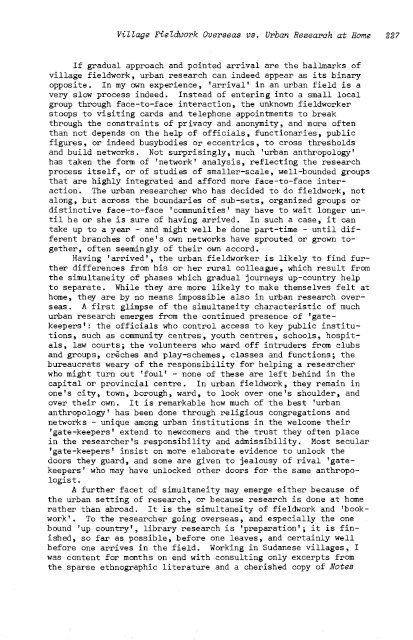CONTENTS NO.I - Institute of Social and Cultural Anthropology ...
CONTENTS NO.I - Institute of Social and Cultural Anthropology ...
CONTENTS NO.I - Institute of Social and Cultural Anthropology ...
You also want an ePaper? Increase the reach of your titles
YUMPU automatically turns print PDFs into web optimized ePapers that Google loves.
Village Fieldwopk Ovepseas vs. Upban ReseaPah at Home 227<br />
If gradual approach <strong>and</strong> pointed arrival are the hallmarks <strong>of</strong><br />
village fieldwork, urban research can indeed appear as its binary<br />
opposite. In my own experience, 'arrival' in an urban field is a<br />
very slow process indeed. Instead <strong>of</strong> entering into a small local<br />
group through face-to-face interaction, the unknown fieldworker<br />
stoops to visiting cards <strong>and</strong> telephone appointments to break<br />
through the constraints <strong>of</strong> privacy <strong>and</strong> anonymity, <strong>and</strong> more <strong>of</strong>ten<br />
than not depends on the help <strong>of</strong> <strong>of</strong>ficials, functionaries, public<br />
figures, or indeed busybodies or eccentrics, to cross thresholds<br />
<strong>and</strong> build networks. Not surprisingly, much 'urban anthropology'<br />
has taken the form <strong>of</strong> 'network' analysis, reflecting the research<br />
process itself, or <strong>of</strong> studies <strong>of</strong> smaller-scale, well-bounded groups<br />
that are highly integrated <strong>and</strong> afford more face-to-face interaction.<br />
The urban researcher who has decided to do fieldwork, not<br />
along, but across the boundaries <strong>of</strong> sub-sets, organized groups or<br />
distinctive face-to-face 'communities' may have to wait longer until<br />
he or she is sure <strong>of</strong> having arrived. In such a case, it can<br />
take up to a year - <strong>and</strong> might well be done part-time - until different<br />
branches <strong>of</strong> one's own networks have sprouted or grown together,<br />
<strong>of</strong>ten seemingly <strong>of</strong> their own accord.<br />
Having 'arrived', the urban fieldworker is likely to find further<br />
differences from his or her rural colleague, which result from<br />
the simultaneity <strong>of</strong> phases which gradual journeys up-country help<br />
to separate. While they are more likely to make themselves felt at<br />
home, they are by no means impossible also in urban research overseas.<br />
A first glimpse <strong>of</strong> the simultaneity characteristic <strong>of</strong> much<br />
urban research emerges from the continued presence <strong>of</strong> 'gatekeepers':<br />
the <strong>of</strong>ficials who control access to key public institutions,<br />
such as community centres, youth centres, schools, hospitals,<br />
law courts; the volunteers who ward <strong>of</strong>f intruders from clubs<br />
<strong>and</strong> groups, creches <strong>and</strong> play-schemes, classes <strong>and</strong> functions; the<br />
bureaucrats weary <strong>of</strong> the responsibility for helping a researcher<br />
who might turn out 'foul' - none <strong>of</strong> these are left behind in the<br />
capital or provincial centre. In urban fieldwork, they remain in<br />
one's city, town, borough, ward, to look over one's shoulder, <strong>and</strong><br />
over their own. It is remarkable how much <strong>of</strong> the best 'urban<br />
anthropology' has been done through religious congregations <strong>and</strong><br />
networks - unique among urban institutions in the welcome their<br />
'gate-keepers' extend to newcomers <strong>and</strong> the trust they <strong>of</strong>ten place<br />
in the researcher's responsibility <strong>and</strong> admissibility. Most secular<br />
'gate-keepers' insist on more elaborate evidence to unlock the<br />
doors they guard, <strong>and</strong> some are given to jealousy <strong>of</strong> rival 'gatekeepers'<br />
who may have unlocked other doors for the same anthropologist.<br />
A further facet <strong>of</strong> simultaneity may emerge either because <strong>of</strong><br />
the urban setting <strong>of</strong> research, or because research is done at home<br />
rather than abroad. It is the simUltaneity <strong>of</strong> fieldwork <strong>and</strong> 'bookwork'.<br />
To the researcher going overseas, <strong>and</strong> especially the one<br />
bound 'up country', library research is 'preparation'; it is finished,<br />
so far as possible, before one leaves, <strong>and</strong> certainly well<br />
before one arrives in the field. Working in Sudanese villages, I<br />
was content for months on end with consulting only excerpts from<br />
the sparse ethnographic literature <strong>and</strong> a cherished copy <strong>of</strong> Notes

















